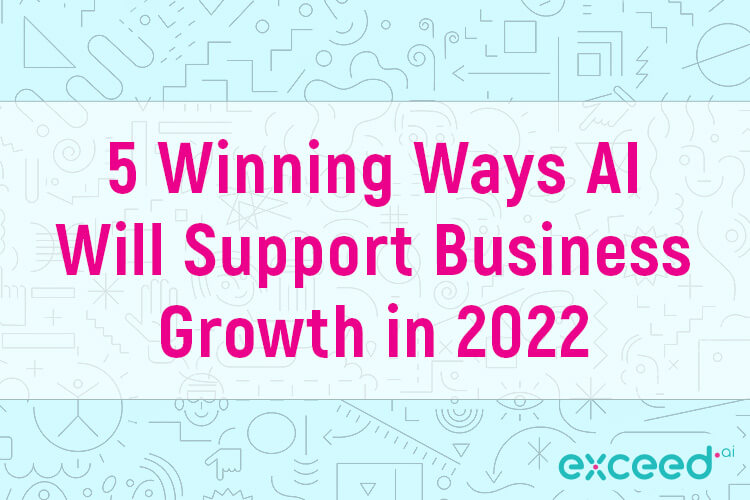Everyone wants to feel that he or she is important.
This is true for your buyer, customers, and it’s equally true for your sales and marketing teams.
While this expression of human nature isn’t new in 2022, it is now that conversational marketing, powered by AI technology and tools, are finally able to support an amazing, customer-centered experience (at scale!), while simultaneously making your sales reps feel more satisfied, accomplished and valued.
Here are the five primary ways we think this vision will realize itself in the year to come:
AI conversations will make a personalized customer experience available for every individual customer
In 2022, a personalized buyer’s journey and customer experience is the name of the game. Delightful buyer experiences are critical in every industry; 71% of buyers say they’ve made a purchase decision based on experience quality.
And it’s not just for B2C brands like Spotify, Netflix, and Amazon. Salesforce’s 2020 State of the Connected Customer report revealed that B2B customers are just as desirous of personalized experiences – and just as disappointed when B2B brands don’t deliver.
Is it easy to deliver a personalized customer experience at scale? Not at all. Sometimes it’s impossible. 63% of digital marketing leaders struggle with personalization, reveals Gartner.
But don’t expect your buyers to go easy on you. As Oracle says in their Virtual Experiences report, “a company’s internal workings and challenges are of little concern to [customers] when assessing its products and services. All that matters is whether a brand is able to meet their needs as and when called upon to do so.”
Is there a solution? Gartner proposes that it’s AI and machine learning. AI-powered virtual sales assistants, for example, have the capacity to conduct personalized customer interaction at scale, even at the early stages of the buyer’s journey. But while 84% of digital marketing leaders agree on AI’s potential as a customer experience solution, only 17% of them have actually implemented AI tools to address personalization.
The time has come to implement. We predict – and hope! – that 2022 will be the year that sees widespread adoption of AI tools to personalize the customer experience for buyers, without undue or unrealistic expectations from marketing and sales personnel.
AI will smooth and expedite the buyer’s journey – both directly and indirectly
When buyers have the information they need, when they need it, they are empowered and motivated to progress toward purchase faster and with more confidence.
When sales personnel have the information they need, when they need it, they are empowered to help the buyer make that faster, more confident progress.
AI is, at its core, a technology that turns information into power. And when it comes to sales, that power is powerful. Sales departments pioneering AI experienced an over 50% increase in leads and appointments, cost reductions of 40%–60%, and call time reductions of 60%–70%.
AI can be used to interact directly with the buyer, through conversational AI agents that conduct intelligent, personalized interactions with prospects and leads. When qualified leads are ready to talk to sales, the AI assistant automatically loops in sales and books a meeting or demo.
AI can also contribute indirectly to better interactions between buyers and sales reps, by giving sales better insights into accounts, more detailed analysis of campaigns, and better identification of prospective customers.
We predict that in 2022, the direct and indirect support that AI provides to the buyer journey will noticeably expedite the buyer journey for organizations that adopt or increase their use of AI sales tools.
AI will increase qualified leads and decrease customer acquisition costs for organizations that leverage AI in their sales process
Human SDRs have a limited amount of time in the day, and they need to decide where it is best to put their efforts, which means that not all potential leads will be addressed in an optimal way to encourage conversion. For example, 80% of sales need at least five emails, but 92% of salespeople give up after four “no’s.”
AI-powered sales assistants create nearly limitless time for lead follow-up and nurturing. They can send the five emails needed for the sale, and more, without having to make a judgment call on whether they’re making the best use of their time. Businesses that have implemented an automated AI virtual assistant together with a sales engagement platform often see 3x more SQLs without adding headcount.
In addition to AI’s exponentially greater availability, it also reduces expenses. The average salary for an SDR is $45K a year; AI-powered sales assistants cost a fraction of that.
When you combine these factors, it’s not surprising that AI sales assistants reduce customer acquisition costs by up to 79%.
In 2022, we predict that more organizations will be reaping the benefits of conversational AI in their sales processes. With fewer leads slipping through the cracks, more follow-up, and more nurturing, forward-thinking businesses will see more sales along with a reduction in their customer acquisition costs.
AI-powered sales assistants will boost business productivity for human sales reps
“Being busy” is not productivity. When human sales reps have to spend their time on simplistic or superficial tasks, they may be keeping busy, but is that time really being used well? Before automation and AI, sales busywork was a necessary evil. With the maturing technology of conversational AI, however, it’s a shame for humans to keep spending time on initial sales conversations (and any other superficial non-revenue generating or satisfying sales work).
In addition, sometimes busyness can increase dramatically, just to keep productivity at the same level. Microsoft found that between February 2020 and February 2021, workers were just as “productive” as the same period the year before, but they were much “busier.”
What were the human results of this busyness increase? 54% of workers reported feeling overworked. 39% reported feeling exhausted. Not good. We don’t want busy workers who aren’t productive, and we also don’t want productive workers who are too busy! Fortunately, AI boosts business productivity without negative costs to humans, by off-loading the busywork to virtual agents.
In 2022, we predict that the workload on sales reps will decrease, along with a greater percentage of sales reps’ time will be spent doing deeper, higher-level sales work. This is the work that delivers a greater ROI for the man-hours spent, and also delivers a deeper sense of satisfaction and accomplishment. This brings us to…
AI sales assistants will create greater job satisfaction and retention for human sales reps
Productivity is great – for businesses. But the humans who work at businesses want more than that. Humans want to feel well-being and respect. Humans want work that is significant and uses their unique abilities. Humans want a work experience that enhances (and certainly does not detract from!) their life experience.
The COVID situation has made employees more keenly aware of these desires – and of how, often, their work situation doesn’t answer them sufficiently. It’s no wonder that 41% of the workforce worldwide is likely to consider leaving their current employer within the next year, in what’s been termed “The Great Resignation.” 46% of those thinking about leaving are intending to make a major pivot or career transition – an even more telling indication of current work dissatisfaction.
For most humans who work in sales, the initial conversations with leads – engaging, following up, re-engaging – are a less than stimulating part of the job. It is often monotonous, boring, and frequently frustrating. An AI-powered sales assistant can take over that part of the lead engagement strategy, automating almost half of administrative sales work, according to Gartner.
The human sales staff will be freed to have real conversations with qualified, high intent leads, and see sales success in a greater percentage of their interactions. That shift has the potential to change and enhance the entire work experience for sales reps. With more reason to stay, and less reason to look elsewhere, the turnover in the sales industry is likely to decrease.
Therefore, as the adoption of AI-powered sales technology increases in 2022, sales reps will experience more job satisfaction, and organizations will see less turnover in their sales staff.
2022: a year to look forward to
Whether you are a buyer hoping that the businesses you interact with will appreciate and address your desires and goals, or a sales rep hoping for a year of satisfying productivity and fruitful accomplishment, AI is primed to deliver an unbeatable experience in 2022.






![Discover The Best Email AI Assistant [AI Unleashed]](https://exceed.ai/wp-content/uploads/2024/01/1_1-400x250.webp)
![The Power Of AI Sales Agents [Autonomous Reps]](https://exceed.ai/wp-content/uploads/2024/01/happy-sales-agent-smiling-400x250.webp)